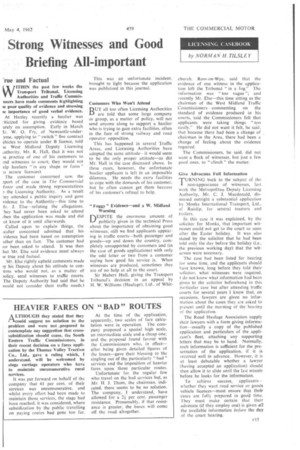Strong Witnesses and Good Briefing All-important
Page 97

If you've noticed an error in this article please click here to report it so we can fix it.
'rue and Factual WITHIN the past few weeks the Transport Tribunal, Licensing Authorities and Traffic Commisoners.have made comments highlighting le poor quality of evidence and stressing me importance of good verbal evidence. At Hanley recently a haulier was :iticized for giving evidence based urely on assumption. Early in March Ir. W. 0. Fry, of Newcastle-underyme, applying to " switch " five contract Aides to operate under B licence, told se West Midland Deputy Licensing wthority, Mr. R. Hall, that it was not le practice of one of his customers to md witnesses to court; they would not elp hauliers "in any shape or form" -co secure licences).
The customer concerned saw, the Tort of the case in The Commercial lotor and made strong representations 3 the Licensing Authority. As a result ley attended a public inquiry and gave vidence to the Authority—this time to 4r. J. Else—refuting the allegations. -hey had never been asked to attend ?hen the application was made and did ot know of it until afterwards.
Called upon to explain things, the aulier concerned admitted that his vidence had been based on assumption ather than on fact. The customer had at been asked to attend. It was then hat Mr. Else said evidence must always le true and factual_
Mt. Else rightly upheld comments made )57 his Deputy about his attitude to con:erns who would not, as a matter of )olicy, send witnesses to traffic courts. The Deputy Authority had said that he would not consider their traffic needs.) This was an unfortunate incident, brought to light because the application was publicized in this journal.
Customers Who Won't Attend
BUT all too often Licensing Authorities are told that some large company or group, as a matter of policy, will not send anyone along to support a haulier who is trying to gain extra facilities, often in the face of strong railway and road operator opposition.
This has happened in several Traffic Areas, and Licensing Authorities have adopted the same attitude--it would seem to be the only proper attitude—as did Mr. Hall in the case discussed above. In these cases, however, the unfortunate haulier applicant is left in an impossible dilemma. He needs the extra facilities to cope with the demands of his customer, but he often cannot get them because of his customer's refusal to help.
"Foggy" Evidence—and a W. Midland Warning
ESPITE the enormous amount of f publicity given in the technical Press about the importance of obtaining good witnesses, still we find applicants appearing in traffic courts—both passenger and goods—up and down the country, completely unsupported by customers and (in the case of goods applications) with only the odd letter or two from a customer saying how good his service is. When witnesses are produced, sometimes they are of no help at all to the court.
Sir Hubert Hull, giving the Transport Tribunal's decision in an appeal by H. W. Williams (Haulage), Ltd., of Whit church, Ross-on-Wye, said that the evidence of one witness in the application left the Tribunal "in a fog." The information was "too vague"; and recently Mr. Else—this time sitting as the chairman of the West Midland Traffic Commissioners--commenting on the standard of evidence produced in his courts, said the Commissioners felt that applicants were taking things "too easily." He did not want it felt, he said, that because there had been a change of chairman in the Area, there had been a change of feeling about the 'evidence required.
The Commissioners, he said, did not want a flock of witnesses, but just a few good ones. to " clinch " the matter.
Give Advocates Full Information
TURN I NG back to the subject of the
non-appearance of witnesses, last week the Metropolitan Deputy Licensing Authority, Mr. C. J. Macdonald, dismissed outright a substantial application by Monks International Transport, Ltd., of Ruislip, for several tractors and trailers.
In this case it was explained, by the solicitor for Monks, that important witnesses could not get to the court so soon after the Easter holiday. It was also stated by the solicitor that he had been told only the day before the holiday (i.e., the previous working day) that the witnesses were necessary.
The case had been listed for hearing for some time, and the applicants should have known, long before they told their solicitor, what witnesses were required. I do not know what information had been given to the solicitor beforehand in this particular case but after attending traffic courts for several years I know that, on occasions, lawyers are given no information about the cases they are asked to present until the morning of the hearing of the application.
The Road Haulage Association supply their lawyers with a form giving information--usually a copy of the published application and particulars of the applicant's fleet, attaching any supporting letters that may be to hand. Normally, such information is sufficient for the presentation of the application, if it is received well in advance. However, it is at least debatable whether a lawyer (having accepted an application) should then allow it to slide until the last minute before he looks for the information.
To achieve success, applicants— whether they want road service or goods vehicle licences—must ensure that their cases are fully prepared in good time. They must make certain that their advocate (if they employ one) is given all the available information before the day of the court hearing.


































































































































































































































































